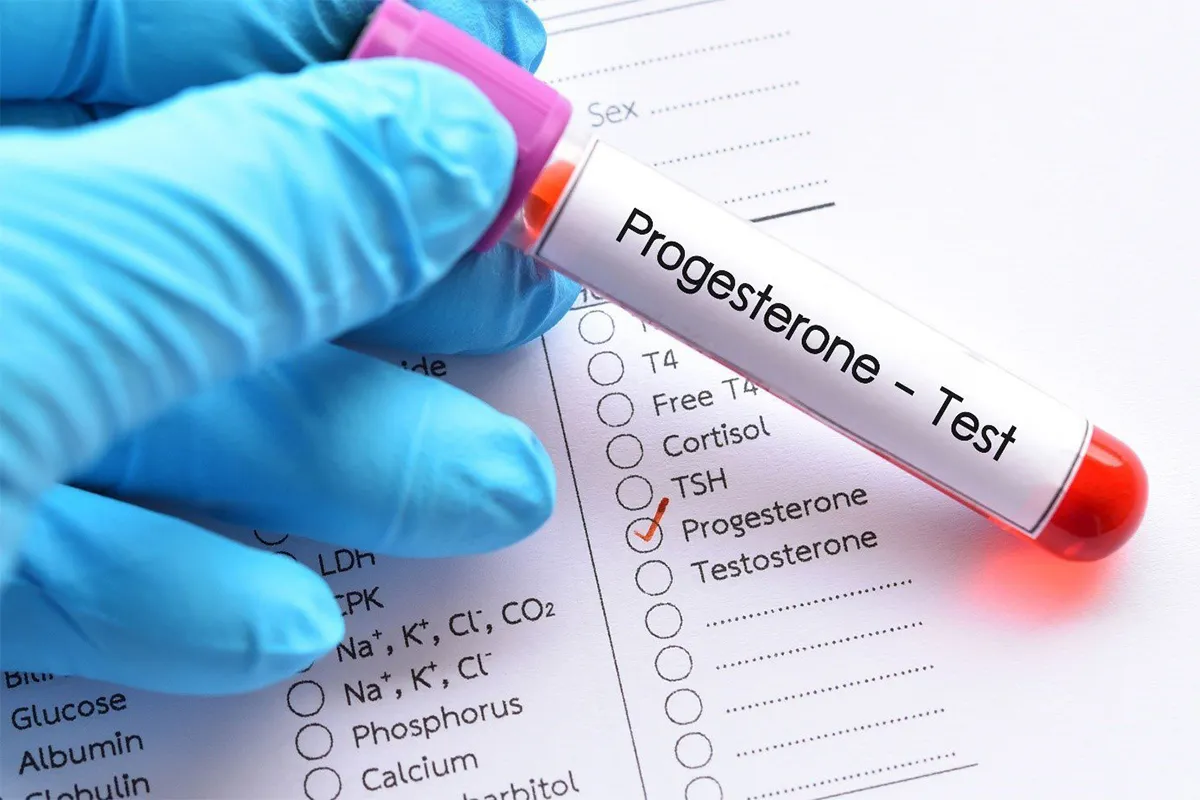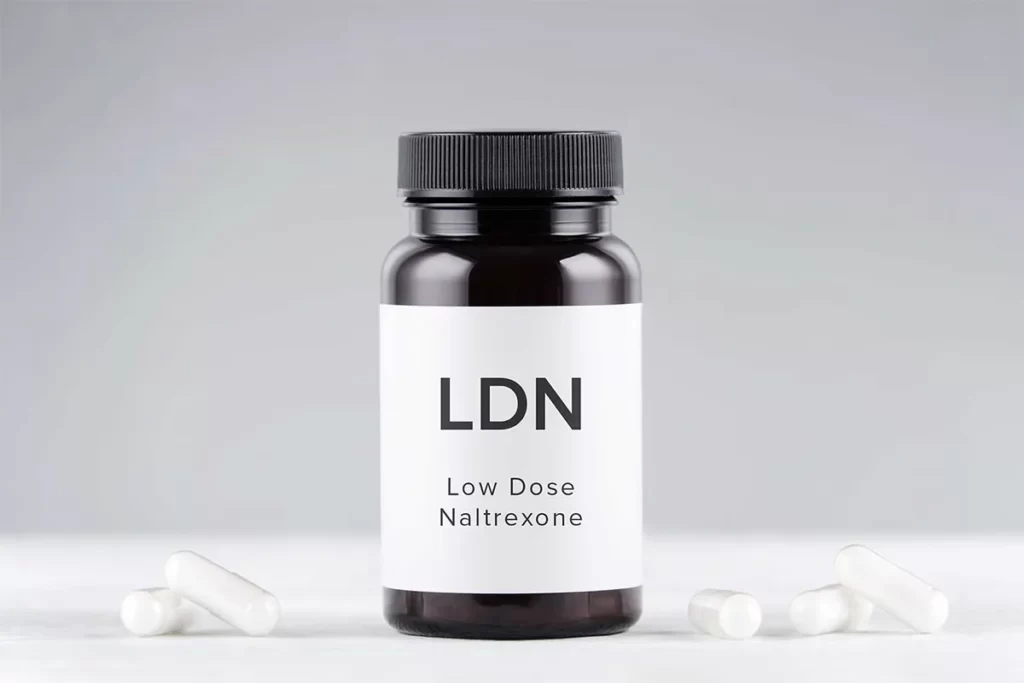Does Progesterone Weight Gain? Analyze Causes and Solutions
-
 Written by
Michael J. Ormsbee
Written by
Michael J. Ormsbee
- LAST UPDATED September 22, 2023
Progesterone is a fundamental female hormone that is integral to the menstrual cycle and fertility. Some women connect variations in their progesterone levels with alterations in their body weight or composition. So, the question arises, does progesterone weight gain? Let’s delve into the scientific aspects of this query.
What Is Progesterone and What Does It Do in the Body?
Progesterone is a crucial female sex hormone that plays many important roles in the reproductive system and beyond. It is produced mainly by the ovaries and adrenal glands in both women and men.
In women, progesterone production fluctuates through the different phases of the menstrual cycle under the regulation of the pituitary gland. Levels are lowest during menstruation, start rising after ovulation, and peak during the luteal phase of the cycle if fertilization does not occur.
If conception happens, progesterone levels remain elevated to support gestation. This progesterone helps thicken and sustain the uterine lining, providing an optimal environment for the early embryo to implant and begin growing.
Progesterone also opposes the effects of estrogen in the body. So it helps balance and regulate estrogen’s stimulation of the uterine lining proliferation. These two hormones work very synergistically together.

Some key functions of progesterone in females include:
- Prepares the uterine endometrium to receive the fertilized egg each month by thickening the blood-rich lining. This supports implantation.
- Counters the growth-promoting effects of estrogen on the endometrium. Helps shed the lining during menstruation if no pregnancy occurs.
- Helps regulate ovulation and menstruation timing when working together with estrogen in a cyclic manner.
- After conception, nourishes and maintains the uterus during pregnancy to carry the developing fetus safely to full term.
- Impacts libido and sexual desire as it fluctuates through the menstrual cycle.
- Contributes to the development of breast tissue. Causes changes in breast size and tenderness during the cycle.
- Influences water retention and can cause bloating or swelling in the breasts, hips, and abdomen at different stages.
- Has effects on sleep quality, body temperature, and mood changes at different progesterone levels.
In summary, progesterone plays an absolutely vital role in female reproductive health and fertility. It promotes menstrual regularity, ovulation, and achieving and sustaining pregnancy.
How Can Progesterone Imbalance Impact Progesterone Weight Gain or Loss?
Research extensively substantiates the presence of a compelling relationship between imbalanced or shifting progesterone levels and apparent changes in women’s body weight and composition. Delving into the key ways these fluctuations in progesterone may trigger progesterone weight gain or loss, we enumerate the following scenarios:
Excessively High Progesterone
Soaring progesterone levels in the body can instigate progesterone weight gain through various mechanisms. An overwhelming amount of circulating progesterone can provoke appetite and hunger, inciting an augmented calorie intake and the potential for weight gain over time.
Low or Deficient Progesterone
Conversely, inadequate progesterone levels are also connected with the likelihood of progesterone weight gain. This reaction transpires owing to the imbalance created between estrogen and progesterone. When progesterone levels are low relative to estrogen, the body becomes more susceptible to increased insulin resistance, inflammation, thyroid changes, and other metabolic malfunctions that encourage progesterone weight gain.
Estrogen vs. Progesterone Imbalance
A harmonious balance between progesterone and estrogen levels in the body is imperative for maintaining optimal health. Investigations reveal that low progesterone in comparison to high circulating estrogen is intimately correlated with abdominal fat deposition and weight gain patterns. This progesterone weight gain mainly stems from the hormonal imbalance.
Hormonal Fluctuations
Since progesterone levels undulate cyclically through the various phases of the menstrual cycle, temporary fluctuations in fluid retention, breast size, food cravings, and other factors contribute to mild progesterone weight gain or loss of a few pounds.
Menopausal Hormone Changes
The gradual decrease, and eventual plummet, of progesterone levels during perimenopause and menopause is tightly associated with changes in body fat storage and distribution. Postmenopausal women tend to experience progesterone weight gain, specifically around the abdomen, when progesterone production dwindles.
Increased Appetite
As a critical player in the hormone drama that unfolds through the menstrual cycle, progesterone, particularly high levels prior to menstruation, can amplify your appetite and intensify cravings for calorie-dense, sugary, or salty foods. The inevitable outcome of this heightened caloric consumption can potentially spiral into a gradual progesterone weight gain over time.
Amplified Fat Storage
Functioning as a fertility hormone, progesterone communicates to the body to store fat in preparation for potential gestation. As a result of these hormonal signals, elevated levels of progesterone sway the metabolic scales in favor of fat creation and accumulation, rather than burning it off.
Fluid Retention
The hormone’s grip extends to affecting the renin-angiotensin system, which supervises the balance of fluids in our bodies. Excessive progesterone can disrupt this equilibrium, causing the body to retain more water and consequently bloat, contributing temporarily to progesterone weight gain.
Digestion Slowdown
In the digestive realm, progesterone can decelerate the movements of the gut, leading to constipation and sluggish digestion. With inefficient gut health and waste elimination, the body becomes astray quickly, and weight gain can follow suit.
Insulin Resistance
Alongside its myriad of effects, high levels of progesterone assume an antagonistic role, opposing insulin activity and diminishing insulin sensitivity. This opposition instigates an escalated insulin output, making it easier for your body to accumulate adipose tissue, especially around the midsection, a phenomenon known as ‘central adiposity’. This process can also contribute to progesterone weight gain.
Thyroid Suppression
Dominant progesterone can depress thyroid hormone levels, taking the wind out of metabolism’s sails. Given the thyroid’s role as the maestro of metabolic processes, a suppressed thyroid function can herald more weight gain.
Fatigue and Reduced Activity
Some women experience a sluggish lethargy when progesterone ratchets up during certain times, such as premenstrual and early pregnancy phases. These feelings can induce a lull in physical activity, decreasing the calories burnt off and promoting fat storage, leading to progesterone weight gain.
Understanding the subtle and not-so-subtle ways progesterone can influence weight gain offers a more comprehensive perspective on progesterone weight gain. As it’s clear from this discussion, elevated progesterone levels can incite a cascade of physiological processes that conspire to preferentially promote weight gain rather than loss in multiple dimensions. This illumination on progesterone weight gain helps us to better navigate the complex crossroads of hormonal balances and healthier lives.

The Other Side of Progesterone Weight Gain, Factors Influencing Low Progesterone
In contrast, the flip side of the hormonal coin reveals that subpar or inadequate levels of progesterone, particularly in relation to its biological counterpart, estrogen, can also be linked to weight gain. Venturing deeper into these underlying causes can shed light on how progesterone imbalance abets progesterone weight gain.
Perimenopause and Menopause
As women traverse the journey of aging, the body’s production of progesterone begins to taper off, a decline that usually predates the drop in estrogen levels. This dwindling progesterone, juxtaposed with the still relatively high estrogen, casts an imbalance that leans towards progesterone weight gain.
Premature Ovarian Failure
When life throws a curveball with the premature malfunctioning of the ovaries, usually before age 40, you’re left with a sharp plummet in progesterone. This precipitous drop can act as a trigger for significant weight transformations, including progesterone weight gain.
Ovarian Cysts or Tumors
Aberrant ovarian growths, such as cysts or tumors, can throw a wrench in the works of healthy progesterone synthesis, tipping it towards deficiency. These hormonal changes can tip the scale toward weight gain.
Eating Disorders
Disordered eating conditions like anorexia or bulimia wield their influence by severely suppressing ovulation and, in turn, progesterone levels. This profound impact throws the body into hormonal havoc, leading to possible weight changes or progesterone weight gain.
High Stress Levels
High-stress levels, particularly when chronic, can eat into your progesterone production, turning it down a notch. At the same time, stress cranks up cortisol, a hormone notorious for encouraging belly fat accumulation. This hormonal see-saw can contribute to eventual weight gain, forming a link with progesterone weight gain.
Insulin and Leptin Resistance
Metabolic mishaps, such as resistance to hormones insulin or leptin, can instigate a cascade of imbalances among reproductive hormones, including lowering progesterone levels. These disruptions can rev up the engine for weight gain.
Chronic Inflammation
The repercussions of chronic systemic inflammation, whether due to a poor diet, illness, or hormonal imbalance, extend to inhibiting progesterone. This restriction, in turn, can fan the flames of weight gain, fitting into the puzzle of progesterone weight gain.
Pregnancy Complications
Certain hurdles during pregnancy or in the postpartum phase, like miscarriage, preeclampsia, or thyroiditis, can cast enormous reverberations on progesterone levels. These dramatic fluctuations can make an imprint on postpartum weight and swing the pendulum towards progesterone weight gain.
Pinpointing the root cause of hormonal imbalance, whether it’s a lone deficiency in progesterone or a disharmony between progesterone and estrogen, illuminates the pathway to more targeted treatment strategies to manage progesterone weight gain. By recognizing and understanding these underpinnings, you equip yourself to overcome the challenge of progesterone weight gain more efficiently.

Assessing Progesterone Levels: A Crucial Step in Understanding Progesterone Weight Gain
Ascertaining your progesterone status is a critical constituent of the holistic approach to understanding progesterone weight gain. Several diagnostic methods can be employed to pin down your progesterone’s ebb and flow and whether it contributes to your weight changes.
Blood Tests
One of the most common preliminary investigations for hormonal imbalances, including progesterone, is a blood test. Ordered by your healthcare provider, these laboratory investigations measure the concentration of progesterone circulating in your bloodstream. For maximum accuracy, it’s recommended to perform the tests at various junctures of your menstrual cycle. This strategy allows your healthcare provider to monitor the dynamic fluctuations in progesterone and draw a parallel if any, to progesterone weight gain.
Saliva Tests
For those seeking a more home-friendly method or for long-term monitoring, Saliva tests are a viable alternative. These user-friendly kits enable you to collect saliva samples which are then analyzed for progesterone levels. This more hands-on approach lends you the convenience of tracking daily changes in your progesterone levels across your cycle. By piecing together these patterns, you can gain deeper insights into progesterone weight gain.
Endometrial Biopsies
In certain clinical scenarios, endometrial biopsies may be carried out to examine tissue for the presence of cellular progesterone receptors. Gleaning this information can provide a window into the hormone’s levels and activity within the endometrial tissues, which can be a further complement to understanding overall hormonal balance and potential links with progesterone weight gain.
Symptom Tracking
An underrated yet potent tool in your arsenal for monitoring progesterone imbalance is symptom tracking. Keeping a comprehensive daily journal to track signs related to progesterone levels helps compose a clearer picture over time. Entries like basal body temperature, cervical fluid changes, the timing of ovulation, and the nature and severity of PMS issues can assemble a reflective sketch of your hormone status. Recognizing changes in these indicators in conjunction with weight gain can help draw connections to progesterone weight gain.
By compiling information from laboratory tests and symptom journaling, you create a broader narrative about your progesterone levels. These data and analyses enable your healthcare provider to diagnose low or high progesterone accurately and promptly, thereby dictating the path for timely and effective treatment, especially concerning progesterone weight gain.
Understanding progesterone’s role in your body and its intricate dance with weight changes is vital to your health management strategy. Gaining control over progesterone weight gain often starts with acknowledging the signs, undergoing appropriate testing, and striving for a healthy hormonal balance under the guidance of healthcare professionals.
Managing Progesterone Weight Gain: Lifestyle Approaches To Support Healthy Progesterone Levels
Controlling progesterone weight gain is a multi-faceted process. Incorporating certain lifestyle modifications – from diet and exercise to stress management – may help maintain optimal progesterone balance, and with it, a healthier weight.
Balanced Nutrition
A significant shift that might assist in modulating progesterone weight gain occurs right on your dinner plate. Consuming a diet abundant in nutrient-dense and organic plant foods, high-quality fats, and proteins ensures you are fueling your body with essential nutrients that support hormonal balance. Steering clear of sugar and processed foods is also pivotal since such edibles can knock your hormones, including progesterone, off-kilter, and contribute to weight gain.
Stress Management
Another critical facet to addressing progesterone weight gain involves managing your stress. When under chronic stress, your body produces cortisol, a hormone that can disrupt other hormone balances, including progesterone. Activities such as meditation, yoga, massage, and nature walks, or indulging in calming teas and adaptogenic herbs, can be instrumental in keeping cortisol and, in turn, progesterone balance in check, which might help stave off related weight gain.
Regular Exercise
Creating and committing to a regular exercise regimen also plays a crucial role in managing progesterone weight gain. A balanced exercise routine, including a medley of cardio workouts, strength training, and stretching, supports hormonal balance. Aim for at least 30 to 60 minutes of physical activity most days to maintain a healthy hormonal equilibrium and weight.
Good Sleep Habits
Sleep often gets overlooked in weight management conversations, but it significantly impacts hormone levels and thus, could affect progesterone weight gain. Striving for 7 to 9 hours of quality sleep nightly and aligning your sleep-wake schedule with naturally occurring circadian rhythms (sleep before 11 PM and wake by 7 AM) could potentially lower the risk of experiencing progesterone imbalance and associated weight gain.
Progesterone-Boosting Foods & Supplements
Making room in your diet for progesterone-boosting foods like yams, broccoli, eggs, nuts, and seeds could stimulate progesterone production naturally. Additionally, certain herbs, such as chasteberry, might provide supplemental support for maintaining progesterone balance.
Avoid Excess Estrogen
To regulate progesterone levels, managing estrogen is equally significant. Limiting external estrogen influences like hormone-laced foods, plastics, and chemically charged personal care products could help minimize estrogen dominance and in turn, progesterone weight gain.
Weight Management
Lastly, since fat tissue has the capacity to convert hormones into estrogen, maintaining an optimal weight fosters proper hormonal balance. This, in particular, is a cornerstone approach to managing progesterone weight gain.

Progesterone Weight Gain: Identifying the Signs and Seeking Prompt Medical Attention
Prompt medical attention can play a vital role in rectifying progesterone imbalances that might instigate weight changes. Knowing when to seek your doctor’s advice is a proactive step in managing issues like progesterone weight gain and ensuring your overall health isn’t compromised.
Consider booking an appointment with your healthcare provider if you experience any of the following symptoms that might indicate a progesterone imbalance:
- Sudden Onset of Weight Gain and Bloating: Experiencing rapid, inexplicable increases in weight, accompanied by bloating or swelling, particularly in areas like the breasts and abdomen, can be a sign that your progesterone is not adequately balanced.
- Changes in Breast Size, Tenderness, and Swelling: Fluctuations or growth in breast size, along with tenderness and swelling, may also point to a progesterone imbalance and its link with progesterone weight gain.
- New Fat Accumulation around the Hips, Buttocks, and Thighs: If you observe a recent pattern of fat deposits localizing around your hips, buttocks, and thighs, it’s worth considering hormonal imbalances, especially in progesterone, and how they might contribute to your weight gain.
- Heavier or Irregular Menstrual Bleeding and Heightened PMS Symptoms: Intensified premenstrual symptoms, irregular menstruation, or heavier bleeding can signify an underlying progesterone imbalance that may be an accomplice to progesterone weight gain.
- Increased Appetite and Cravings: A sudden surge in food cravings, especially for sugar or salty treats, and a persistent change in your appetite may be more than a passing whim and could signify progesterone-connected weight issues.
- Severe Fatigue, Sleep Troubles, and Mood Fluctuations: If you’re grappling with ongoing exhaustion, difficulties in catching enough z’s, and mood swings like anxiety or irritability, a potential underlying cause could be a progesterone imbalance leading to progesterone weight gain.
- Slow Digestion and Gastrointestinal Issues: Gastrointestinal woes, such as constipation or slow digestion, can also be attributed to fluctuating progesterone levels, which may ultimately contribute to progesterone weight gain.
- Reduced Libido and Vaginal Dryness: Lastly, noticing a dip in libido or onset of vaginal dryness might point to underlying hormonal imbalances that include an impact on progesterone and implicitly, weight management.
- Drastic changes in weight: Either gain or loss that exceeds 10% of your total body weight, particularly if the transformations occur suddenly, without any significant variation in your dietary or exercise habits
- Difficulty in conceiving or recurrent miscarriages
If any of these symptoms become too real, don’t ignore them. They might point toward underlying conditions such as Polycystic Ovary Syndrome (PCOS), endometriosis, thyroid imbalances, or premature menopause. An early medical intervention can be instrumental in getting hormones, including progesterone, back on track, and managing progesterone weight gain.
When it comes to prescription treatments and strategies, the choice depends on the specifics of your condition. If low progesterone and associated weight gain is the issue, your specialist may explore different therapeutic interventions, including:
- Progesterone supplements in the form of pills, creams, or injections to correct deficiencies
- Natural supplements such as chaste berry extract to boost progesterone levels
- Medications to enhance insulin sensitivity and reduce androgen levels, specifically in cases of PCOS
- Metformin or inositol prescription to augment ovulation and progesterone cycles
- Estrogen-modulating drugs to tackle estrogen dominance
- Thyroid medication, if low thyroid function contributes to low progesterone
In cases of excess progesterone and weight changes, the treatment may necessitate:
- Reduction or discontinuation of progesterone supplementation
- Prescription of drugs to induce menstruation or regulate cycles, such as birth control pills
- Medications like diuretics to alleviate fluid retention and bloating
- Surgical intervention for ovarian cysts or tumors causing elevated progesterone levels
When navigating women’s health issues like perimenopause and menopause, customized hormone replacement therapy (HRT) with bioidentical hormones could help stabilize progesterone levels and ward off weight changes.
Engaging with your healthcare provider early on and seeking timely intervention can restore the delicate hormone balance, including progesterone. Not only could such a proactive approach help manage progesterone weight gain but it could also significantly improve a wide array of other progesterone imbalance symptoms. Your health is worth it—don’t hesitate to seek help when unexplained changes start to unsettle your life.
Finally
The impact of progesterone on weight is highly variable between women depending on what imbalance exists, other hormone interactions, genetics, diet, lifestyle, and health status.
Work with a knowledgeable physician to have your progesterone levels properly evaluated in relation to estrogen and other hormones. Slight fluctuations are normal, but persistently high or low levels indicate an imbalance that requires prompt treatment and correction guided by lab test results and symptom tracking.
Incorporate positive diet and lifestyle habits focused on hormone-balancing nutrition, regular activity, stress management, and proper sleep. Avoid weight loss fads.
With proper diagnosis of any underlying hormonal disorders, customized treatment, and consistent healthy habits, you can optimize progesterone status and achieve healthy weight goals. Stay in tune with your body!

FAQs about Progesterone Weight Gain
1. Does progesterone birth control cause weight gain?
Birth control pills, injections, and implants typically contain synthetic progestins. While these are similar to progesterone, they are not identical and may produce different effects. Some women may experience fluid retention, an increase in appetite, and resultant weight gain when using these contraceptives. However, not all birth control methods result in weight gain and thus, comparing the types and formulations can help determine the optimal contraception with minimal weight effects. Consulting with a healthcare provider is advisable before initiating or changing any contraceptive method.
2. Do progesterone supplements help with weight loss?
When the progesterone level is low, supplements can help restore a hormonal balance, which might mitigate erratic hunger and cravings thereby promoting weight management. However, it’s essential to remember that the use of external progesterone should be appropriately regulated as an excess can incite weight gain.
3. Does progesterone cream cause weight gain?
Topical progesterone creams usually have minimal absorption into the bloodstream, reducing the likelihood of a significant impact on weight. However, individual responses can vary, and some women may report gaining weight after consistent use over an extended time. Regular monitoring of hormone levels is necessary during such supplementation.
4. Is it harder to lose weight on progesterone?
Progesterone, particularly at high levels, signals the body to store fat and this can potentially make weight loss more strenuous. Yet, keeping progesterone levels optimal, not overly high or low, might facilitate weight loss by maintaining a balanced metabolism.
5. Can stopping progesterone help me lose weight?
Discontinuing progesterone supplements abruptly when your body is accustomed to the external supply potentially leads to hormonal crashes and larger weight gain. Therefore, always taper off slowly under medical guidance to avoid adverse effects.
6. Why am I losing weight on progesterone?
If progesterone was previously deficient, supplementation can help rectify underlying issues such as thyroid dysfunction, insulin resistance, and cortisol accumulation that precipitate weight gain. Restoring these functions might in turn stimulate weight loss.
7. Does progesterone cause belly fat?
Excessive progesterone can modify fat storage patterns, making the body store more fat in the central abdominal area rather than the hips and thighs, similar to estrogen's role. This shift in fat storage patterns can be due to an imbalance between the two hormones.
8. Can progesterone help with weight loss after pregnancy?
Restoring optimal progesterone levels postpartum can help new moms lose baby weight by bringing about hormonal balance. Yet, extending the supplementation with progesterone beyond the required period postpartum may increase weight.






